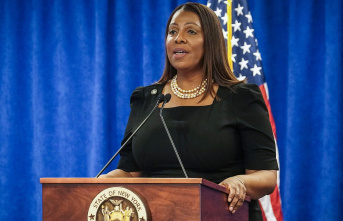"The beauty standard in our society, it is to be white," explains the activist Khawla Ksiksi the feeling of life of many women in your country. She is co-founder of the group Voices of Black Tunisian Women. "Black women are pressured to straighten your hair, your Curls and get rid of your skin to lighten, in order to be accepted by the company and to your Standards", so Ksiksi, compared to the Thomson Reuters Foundation.
Very often, this Ideal is passed on in families. For example, if mothers advise their daughters, bleach use for the skin. "If a young woman wants to marry, it is expected that she is light-skinned." So Suzan Kim Otor from the platform #defyhatenow describes to the news channel al-Jazeera, the popular expectation in South Sudan. "If you dispensed with bleach, you will notice that your friends talk bad about you."
self-critical discussionsThe self-understanding of dark-skinned women is just one of several topics to be discussed since the violent death of the African-American George Floyd in Minneapolis at the end of may in the Arab world violently. In the Wake of the Black-Lives-Matter-movement, many activists in the Region to also ask self-critically, the extent to which there is a specifically Arab-Muslim racism.
This discussion of Muslims in Germany now. "In Parts of the Muslim Community in this country, there is at least a serious confrontation with its own Racism," says Eren Güvercin, Journalist, author, and member of the Advisory Council of the Alhambra company, which has discussed the topic recently in an Online event.
"The causes of racism, anti-Semitism and other forms of group-focused enmity are, in most cases, the same," says dove in the DW-interview. "Through the devaluation and dehumanization of the Other, the own Superiority is to be demonstrated." Anyone who thinks so, and is, have, therefore, not necessarily a guilty Conscience. "Some Muslims believe that they could return with phrases like 'A Muslim, even not a racist or anti-Semite can be this Problem under the carpet." A self-critical discourse, which they see as a betrayal of one's own culture and history.
racism as a colonial ImportThe pure Conscience, the dove here alludes, at least in Parts of it back to the European colonial history that began with Napoleon's Egyptian campaign in 1798. During the colonial period, had the Arabs subject to the standards of the European colonization, says the British-Sudanese artist Rayan El Nayak in the Online magazine scene Arabia. This urge to foreign standards to acquire, after acting up today. "So the Arabs are starting to hate their own skin or their own culture," she outlines the mechanisms of this complicated self-relationship.
The impact on the ratio between light-skinned and dark-skinned Arabs or Muslims. Often felt the former to be superior. "We are modern, but these people are not it" - this is the self-understanding of many light-skinned people in the Region, El Nayak. Dark-skinned or black people are devalued by deep-seated Stereotypes, in part, in the everyday language of Arab countries are widely used terms such as "servant" or "slave".
The legacy of the slave tradeHowever, this has roots even further back: Over the centuries, acted in almost all Arab societies with slaves deported from the countries in sub-Saharan Africa, to sell them to European traders, or even of forced labour to submit to. Slaves were used in some ruler-eras in the army. "From dynasty to dynasty, from century to century, the slavery became a Muslim reality," writes the Algerian anthropologist Malek Chebel, in his great study on slavery in the Islamic world ("L'esclavage en terre d'islam", 2007).
An unspoken hierarchy of skin colors is determined by the ratio of the population groups in Parts of the Arab world until today. In Egypt, dark-skinned Nubians are often treated as second-class citizens. In the past, it has been formed out of the prejudice that skin belonged to color and social class together, the Egyptian historian, Amina Elbendary, compared to the Online magazine Egyptian Streets: "it also meant that a dark skin color with the belonging to the working or serving class has been associated."
a Variety of racist experiencesAs in all parts of the world, racism is today in the Arab world in very different forms. A dramatic example of the enslavement of African immigrants by criminal gangs in Libya. In everyday life there are a variety of racist discrimination. A Tunisian activist, lamented recently on the Online platform Qantara, this show, for example, to taxi drivers who refused to accept black passengers, or families, relationships, and marriages between people of different skin approved color miss. In Lebanon, a comparatively wealthy citizens set recently your Ethiopian domestic help in the Wake of the economic crisis and the Corona to have a pandemic simply on the street, often without their wages paid.
The actress and Director Maryam Abu Khaled said in a much-publicized Instagram-Video areas on your racist everyday experiences as Black people in the Palestinian autonomy. Often there is no intentional hostility, but a rather thoughtless dealing with racist stereotypes, was behind Maryam Abu Khaled explained in the whimsically-designed Video. So you've experienced that parents have warned their children in your presence, before too much exposure to the sun, in order to sow later, "how Maryam". In a Video of the Comedian-group date offender also dark-skinned Muslims, reports in Germany about discrimination in the majority society, but also within their own Community.
The Journalist and activist Eren Güvercin the Alhamra society has a clear opinion of how racism within Muslim Communities can be overcome - and must: "By speaking as a Muslim openly about it and is not silent. And by reflecting self-critically about the Islamic history and not in their romanticizing of the film."
author: Kersten Knipp
*The contribution ", "no" to racism in the Arab world" published by Deutsche Welle. Contact with the executives here.
Deutsche Welle Date Of Update: 06 July 2020, 00:27










